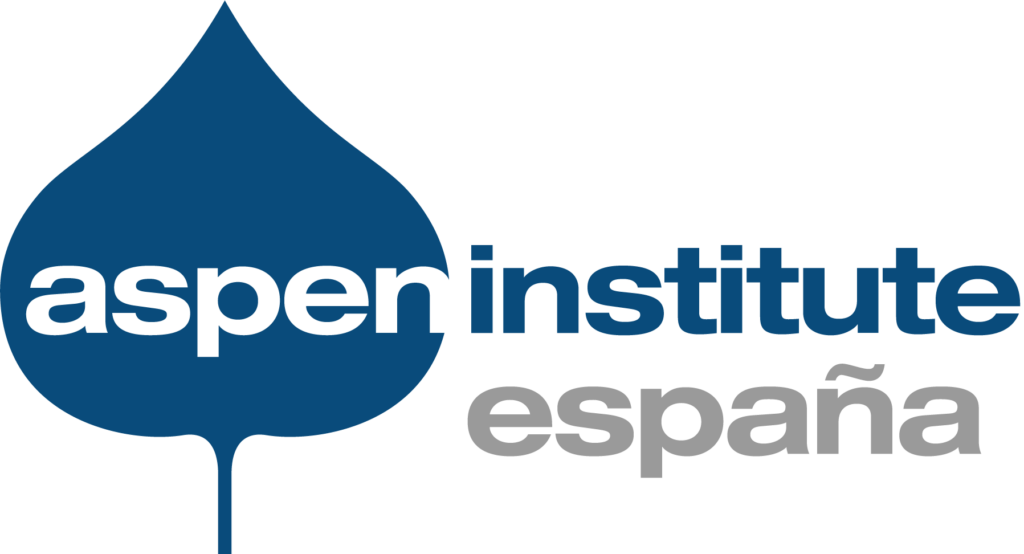Tech & Society Debate «Can Europe help bridge the US-China gulf on AI governance?» with David Rennie
Aspen Institute España, and Fundación Telefónica, hosted the second debate session of the IX edition of the Tech & Society Program with David Rennie, Geopolitics Editor of The Economist, on Thursday, September 4th. The session titled «Can Europe help bridge the US-China gulf on AI governance?» was moderated by José M. de Areilza, Secretary General at Aspen Institute España. The session took place in English at Espacio Fundación Telefónica (C/Fuencarral, 3. Madrid).
Two giants – the United States and China – are locked in a competition over the future of AI. Their rivalry is disrupting technology markets and supply chains. It may divide the world into blocs that use different standards, political norms and philosophies of AI governance.
A third player, Europe, hopes to be more than a hapless bystander, and has some hard decisions to make about the balance that it wishes to strike between regulation and the promotion of innovation. Just to make matters more complicated, there is no consensus about the nature of this AI contest.
The most alarming view portrays the AI competition as an arms race, like the contest to acquire nuclear weapons. In this version, America and China are in a sprint to develop world-changing technologies, such as Artificial General Intelligence, which could bestow global dominance on the winner. Vice-President J D Vance has called for AI safety controls to be eased lest America loses this arms race and finds itself “enslaved to PRC-mediated AI”.
Another view is that AI is more like the internet. In this model, China’s priority is to develop a version of AI that is at once powerful and fully controllable by the Chinese Communist Party. Just as China has built its own internet behind a Great Firewall of controls, Chinese law declares that AI large-language models must not permit content that “damages the unity of the country and social harmony.” China is comfortable with algorithms that embrace state censorship and surveillance, and approaches to the profiling of criminal suspects that would be unconstitutional in many Western democracies. Chinese tech entrepreneurs see chances to sell such autocrat-friendly technologies around the world.
Finally, there are others who argue that China’s edge is its capacity to adapt new technologies to commercial uses and to develop practical applications, as if AI is more like electricity – a transformative force that will usher in new industries, public services and tools of governance. In this form of the contest, AI will be the fuel that powers a competition between two rival economic, industrial and political models.
If this contest is to end safely and productively, some sort of consensus will have to be reached between the major powers. An optimist would present the European Union as well placed to help shape that common understanding. A regulatory super-power with considerable leverage as the world’s last remaining open, super-sized consumer market, the EU stands mid-way between the individualism and risk-taking of the US and the smothering state control of China. It was a pioneer in AI governance with the AI Act, and its focus on precautionary, values-based regulation aims to build trust among anxious citizens and consumers. A sceptic would note that Europe lacks AI tech champions of its own and is under pressure to ease off on regulation in order to promote inward investment.
David Rennie
David Rennie is Geopolitics Editor of The Economist and author of The Telegram column. He joined The Economist in 2007. From 2007-10 he was the EU correspondent and “Charlemagne” columnist, based in Brussels. From 2010-12 he was British political editor and “Bagehot” columnist, in London. In the summer of 2012 he moved to Washington DC. He was “Lexington” columnist 2012-17, and Washington bureau chief 2013-18. From 2018 to September 2024 he was Beijing bureau chief and “Chaguan” columnist. Previously, he was on the foreign staff of the Daily Telegraph, with postings in Sydney, Beijing, Washington DC and Brussels. He won the 2010 UACES/Thomson Reuters “Reporting Europe” award. The Asia Society awarded the 2023 Osborn Elliott Prize for Excellence in Journalism on Asia to David Rennie and Sue-Lin Wong for their coverage of China.
IX Edition of the Tech & Society Program
The Tech & Society Program has become Spain’s leading forum for reflecting on the major issues raised by the advancement of digital technology. The 9th edition will bring together various leaders from all sectors of civil society to debate new technological challenges and their impact on diverse fields such as human relations, politics, education, culture, the economy, and medicine.






